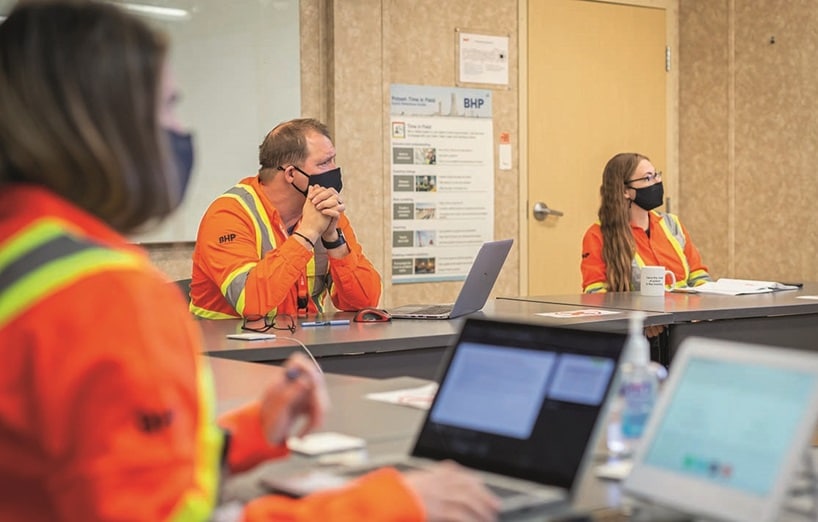At BHP, safeguarding and protecting our assets is everyone’s responsibility. Our assets include our operations and physical items like equipment, inventory, and tools, as well as intangible assets like; our intellectual property, technology, data, and sensitive data or information.
-
What it means for you
Our operational discipline is one of our strengths, and we’re committed to maintaining it by understanding the risks related to our tasks and following Our Requirements. We recognise the importance of our resource and mine plans, so we work and act in an integrated way when we make decisions about our assets. This approach is technically sound and helps us safeguard BHP’s world-class asset portfolio.
Protecting BHP’s assets means we use them as intended, in accordance with Our Requirements and supporting procedures.
Maintaining world-class assets helps us create long-term value and ensure our success. Safeguarding our assets keeps our operations running and our people safe.
-
How you make an impactYou consider the mining value chain and interconnected nature of operational risks before making decisions, you protect our assets, observe confidentiality, do not share commercially sensitive information, and speak up immediately about any suspected misuse, damage, loss, theft or negligence that could jeopardise our assets.
-
Resources
Technology and Cybersecurity Global Standard
Data Global Standard
Geoscience Global Standard
Water Management Global Standard
Geotechnical Global Standard
Tailings and Water Storage Facilities Global Standard
Closure and Legacy Management Global Standard
Mine Engineering and Planning Global Standard
Business Conduct Global Standard

Always
• Use our assets for their intended purpose.
• Protect our assets from waste, damage, misuse, interference, unauthorised access, modification or disclosure loss, fraud and theft.
• Report any potential waste, damage, misuse, loss, fraud or theft of our assets.
• Prevent unauthorised personnel from accessing our facilities, information, data or other assets, where possible and safe to do so.
• Report suspicious emails, text or calls to Cybersecurity.
• Immediately report actual or suspected ransomware or cyber extortion incidents to Cybersecurity.
• Refer to data retention and disposal schedules in the BHP Data Catalogue before disposing of data.
• Follow the Data Global Standard when creating, capturing or managing information.

Never
• Use BHP’s assets for personal gain.
• Take physical property or information assets belonging to BHP for personal use.
• Transfer BHP data or information outside of BHP systems without prior approval from your line leader and/or information owner.
• Enter into any fraudulent or illegal transactions or fail to report any fraudulent activity.
• Take any action that undermines the integrity of vendor or customer data in our systems.
• Permit unauthorised entry to a BHP site or office, or access to our information technology.
• Ignore security complaints or an inadequate security procedure that may present threats to our people or assets.
Hypothetical scenarios
-
Q: My team has recently changed to a new performance monitoring application. No one uses the old system. Can I delete the data in the old system?A: Historical data is an asset. The data retention and disposal schedule in the BHP Data Catalogue should be consulted before deleting data.
-
Q: While at work, a co-worker asked me to perform a minor repair on his personal vehicle so he could get home safely. Given it’s a small job it won’t take long to fix, and we’re not busy today, is it okay if I use my work tools?A: It is never ok to use BHP property, tools or equipment for personal use no matter how quick the job may be. Tools should only be used on BHP equipment and for work purposes. If you are concerned about the safety of your colleague’s means of transport, please deal with that as you would any other safety concern but it is never ok to conduct repairs using BHP property.
-
Q: I work as an Administrative Assistant and sometimes my line leader asks me to perform work for his personal business during work time. I don’t want to question my line leader or 2Up leader, or get anyone into trouble, but I also don’t want to do anything wrong. What should I do?A: You should not be asked to work on personal business matters or use BHP property, including Technology systems, for these purposes. BHP’s assets, information systems and communication resources should only be used for BHP business purposes. You should tal to the Ethics and Investigations team, Legal or contact EthicsPoint.
-
View more hypothetical scenarios
How to speak up
If you have questions about Our Code, speak to your line leader, 2Up leader, Ethics and Investigations, Compliance, or Legal. Employee Relations or a HR Business Partner can direct you to the relevant reporting options available. You can also seek further information and resources via BHP’s RespectChat. Anyone who works with us, on our behalf, or is associated with us, can also raise misconduct concerns via Integrity@BHP or the BHP Protected Disclosure Reporting Channel.
Online: Make a report in either Integrity@BHP or the BHP Protected Disclosure Reporting Channel.
Phone: You can also contact the BHP Protected Disclosure Reporting Channel by phone.
Download Our Code
-
Our Code - English
pdf
2732312

-
Our Code Glossary - English
pdf
291000

-
Our Code Scenarios - English
pdf
12201899

-
Our Code - Spanish
pdf
2657627

-
Our Code Glossary - Spanish
pdf
73373

-
Our Code Scenarios - Spanish
pdf
3341580

-
Our Code - Portuguese
pdf
2691745

-
Our Code Glossary - Portuguese
pdf
170733

-
Our Code Scenarios - Portuguese
pdf
3350980

-
Our Code - Chinese
pdf
2903283

-
Our Code Glossary - Chinese
pdf
318575

-
Our Code Scenario - Chinese
pdf
4225660

-
Our Code - Malaysian
pdf
2695559

-
Our Code Glossary - Malaysian
pdf
68863

-
Our Code Scenarios - Malaysian
pdf
3317546

